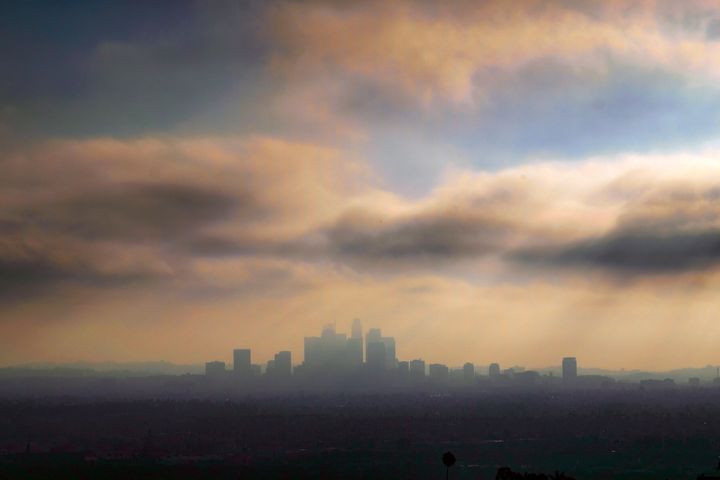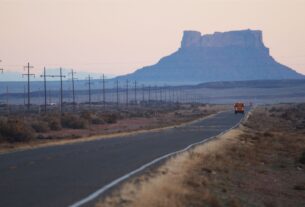
LOS ANGELES — Industry groups are pushing for California regulators to delay new environmental measures, including those meant to promote clean air. Their reason: the economic stress the COVID-19 pandemic is putting on their businesses.
Groups have sent at least six letters to California officials in the past two weeks requesting delays or modifications to new pollution limits on the oil and gas, transportation, building and agriculture sectors, according to documents shared with HuffPost. The rules are set to go into effect later this year, but industry is asking to push back or indefinitely delay those implementation dates.
The businesses represented say that given the economic strain, it’s simply not the time. Industries have seen success with that argument on the national level, after the Trump administration paused federal environmental regulations last month. But California, one of the most environmentally stringent states in the country, is a different battle. Given the long-standing industry opposition to the new rules, the effort to tie the coronavirus to the same regulations reeks of opportunism to critics ― made particularly disturbing as the rapidly spreading disease specifically affects people’s ability to breathe.
Bill Magavern, policy director for environmental advocacy group The Coalition for Clean Air, likened some of the industry requests to “wartime profiteering.”
“It’s cynically trying to take advantage of a national emergency to achieve their own goals of just increasing their profits at the expense of public health,” he said. “All of these polluters [are] trying to exploit this crisis as a way to delay or even weaken health protective standards that, of course, they had never liked.”
California’s Unique Position
The coronavirus pandemic has caused major damage to the U.S. economy, bringing everything from restaurants to retail to a halt. The country’s daily economic output is down 29%, according to Moody’s Analytics.
The situation in California is more dire. The state has lost an estimated 32% of its daily gross domestic product output largely due to the statewide lockdown. Industry groups repeatedly noted these effects in letters to California officials.
The Truck and Engine Manufacturers Association, which represents 28 companies that manufacture internal combustion engines and heavy-duty trucks, asked California for an indefinite delay of a new tailpipe pollution regulation. It argued in a March 23 letter that the California Air and Resources Board should “take account of the incredibly adverse impacts on manufacturers that have occurred, and that continue to evolve as a direct result of the COVID-19 crisis.”
The association also asked officials to delay or “significantly” modify plans to implement two new regulations increasing tailpipe emissions standards for heavy-duty trucks in California and requiring manufacturers to offer for sale zero-emission vehicles in the state. Heavy-duty trucks are responsible for nearly 25% of diesel particulate pollution and 8% of total greenhouse gases across California.
Those rules “always were going to be challenging,” the group wrote, but “they simply are no longer sustainable or implementable on top of the economic strains caused by the on-going COVID-19 crisis and the apparent recession that we now face.”
The Western Growers Association, an industry group representing commercial farmers, separately asked California Gov. Gavin Newsom (D) to issue an executive order temporarily halting development of new environmental regulations on agriculture, also citing COVID-19. This New WorldThe current capitalist system is broken. Get updates on our progress toward building a fairer world.
“Agriculture and food production have been deemed an essential activity,” the letter dated March 20 read. “This is simply not the time to add to the intense burdens farmers are facing.”
The California Association of Port Authorities, which represents the maritime industry, called for “a pause” on an expected regulatory package meant to reduce air pollution from cargo ships until January 2021. Environmentalists say the new rule is imperative for Southern California, where oceangoing vessels are anticipated to be the largest source of smog-emitting pollution by 2023.
A separate March letter signed by 22 different trucking and growers associations requested “an immediate pause” to the ongoing development of the state’s Transport Refrigeration Unit regulation―which impacts diesel powered refrigeration trucks. The most recent draft of the regulation was released on March 12, with updates focusing on improving the efficiency of refrigerated freight transportation and increasing the use of zero emission technologies.
‘Just So Contrary To Public Health’
California Air and Resources Board spokesperson Stanley Young said that while regulatory deadlines have not changed, board staff is working with industry parties “on specific issues related to specific programs on a case-by-case basis.”
In that capacity, CARB has granted requests to extend public comment on some of the regulations including the final cargo ship rule, the draft of the rule for refrigerated trucks and the amendments being considered to the heavy-duty truck emissions standard, Young said.
Young said the decision to extend the timeline for individuals and businesses to comment on the rules would allow parties “ample” time to participate. But the pandemic doesn’t mean industries can stop following the state’s current pollution regulations.
“CalEPA recognizes that, due to restrictions in place related to COVID-19, regulated entities may have additional need for compliance assistance or enforcement relief,” the agency said in a statement. “If an entity cannot meet a regulatory requirement, it should contact the applicable CalEPA board or department or appropriate local partner before falling out of compliance.”
Some of the industry letters asked for indefinite delays to all new regulations in general, not just specific concerns.
The California Independent Petroleum Association cited coronavirus in its argument to halt the hiring of 128 new oil production oversight staff slated under the state geologic agency’s latest budget proposal, staff positions that the industry would fund at an estimated cost of $24 million annually. They said the plan was “problematic before the COVID-19 outbreak.”
“Now, with a global pandemic, the economy in turmoil, and oil prices plunging due to a price war and oil glut caused by Saudi Arabia and Russia, California’s independent producers are experiencing unprecedented challenges,” the group wrote in a March 30 letter to the California Natural Resources Agency.
A March 22 letter from the Construction Industry and Air Quality coalition sent to Newsom requested he mandate that the California Air and Resources Board “suspend any further regulatory development” until the pandemic is over, calling their intent to continue to monitor air pollution rules “draconian.”
“It is completely tone-deaf for CARB to be making these demands in this uncertain environment,” they wrote.
Last week, the Environmental Protection Agency finalized its replacement vehicle emissions rule, which weakened the tailpipe pollution standard the Obama administration and California leaders had jointly developed. California’s Attorney General Xavier Becerra has already threatened to sue over the changes to the regulation, which is likely to negatively impact the state’s variable air quality.
Magavern of the Coalition for Clean Air said any delay on air pollution rules could have long-term impacts for California.
“We are, of course, in a public health crisis. And we know that air pollution makes people more susceptible to respiratory infections,” he said. “So the idea that anybody thinks we should ease up on air pollution, at a time when people’s lungs are more at risk than ever, is just so contrary to public health.”


